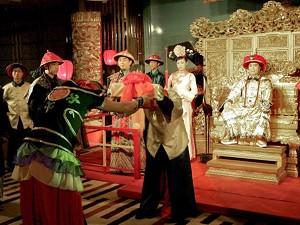As the official language of China’s Qing Dynasty (1644 – 1911 AD), the Manchu language has great significance in China’s culture and history, and its influence stretches over centuries. Although the current population of Manchu in China is nearly ten million, fewer than 100 people can speak Manchu, according to Chinese scholars. At this time, fewer than 50 people are engaged in translating the Manchu written language to Mandarin. Among them, scarcely 20 people are proficient in the Manchu written language. If Manchu just vanished someday, much historical evidence from the Qing Dynasty would never be deciphered.
According to Life Daily, on September 28, the last Manchu-speaking people in China are the elderly and middle-aged Manchus in Sanjiazi Village of Fuyu County in Heilongjiang Province in northeastern China. In a formal study conducted by the Heilongjiang Manchu Research Institute, the fact that Sanjiazi Village is viewed as the “living fossil” of the study of the Manchu language, shows that the decline of Manchu language has obviously accelerated. .
Statistics of a 2002 survey indicated that only three villagers could speak Manchu very fluently and only 15 villagers could understand Manchu well and speak fairly well. The majority of those with a good command of the Manchu language are between 50 and 70 years old. The oldest is 86. Follow-up surveys in subsequent years revealed that the conversation ability of these elderly Manchus has gradually degenerated. Today none of them can tell folk tales and legends in Manchu. The topics of their Manchu discussion are also confined to the simple vocabulary used in daily life.
As it was the official language of the Qing Dynasty, the importance of the Manchu language in China’s history cannot be overemphasized. A large vocabulary of words utilized in the modern dialogue of Mandarin originates from Manchu. According to academic research on Dream of the Red Chamber, a famous novel that depicts life in the Qing Dynasty, what makes the diction of the novel especially charming is the author’s success in mingling a large number of Manchu words and imitating the way Manchus speak Mandarin.
In the later stage of the Qing Dynasty, Manchu was no longer the official language. As a result, the utilization of Manchu underwent a drastic reduction. During the late Qing Dynasty, the Manchu-speaking territory has shrunk to the northeastern China where Manchus congregated. In the inner regions of China, even the imperial aristocrats nearly abandoned learning Manchu. The teaching of Manchu was finally abolished after the Xinhai Revolution in 1911, which brought an end to the Qing Dynasty.
Since the Chinese Communist Party (CCP) seized power in 1949, the origin and development of Manchu suffered an unprecedented impact. The situation has become particularly worrisome in recent years. According to a survey conducted by Professor Zhao Aping of the Manchu Language and Culture Research Center in the University of Heilongjiang, all of the people in Sanjiazi Village, regardless of their age, used to speak their native Manchu language in their daily dialogue before the 1950s, and those people of Han nationality who married Manchus could also speak Manchu. Some of the elderly in the village could read the Manchu language and write letters in Manchu, as well. Since the late 1950s, however, Manchu was viewed as a sort of “cant” or “laggard language”. Those Manchu-speaking people who could not speak or understand Mandarin were classified as part of the “Five Black Categories”. These adverse factors have hindered Manchus from speaking Manchu publicly.
As the political tension in China started to alleviate in 1980s, the Sanjiazi people consciously continued to speak Manchu. Some elderly villagers taught Manchu to their offspring. Even so, the Manchu-speaking population continued to decline rapidly. Many Manchu language expression forms have diminished or even been completely destroyed.
Throughout the past century, the history and culture of the Manchu language have drawn widespread attention from academic circles all over the world. During the past two decades, scholars and experts from 23 countries devoted themselves to research on the Manchu language. In contrast to the large amount of human resources and funds that Japan and Korea have dedicated, China’s investment in studying Manchu has been very weak and minimal. The number of qualified translators and research staff for Manchu is merely 100. Insufficient budget also seriously impedes the research.
A tremendous volume of archives and records in Manchu, a total of over two million pieces in the national archives, were left behind after the 268-year span of the Qing Dynasty. In the public record office of Heilongjiang Province alone, the Manchu archives amount to 60 tons in weight. To fully translate these precious historical Manchu documents would take 100 translators working for 100 years. At present, however, fewer than 50 people are in translating Manchu to Mandarin, and scarcely 20 of them are quite at home in Manchu. If the Manchu language vanishes, much historical information about the Qing Dynasty will remain secret.





